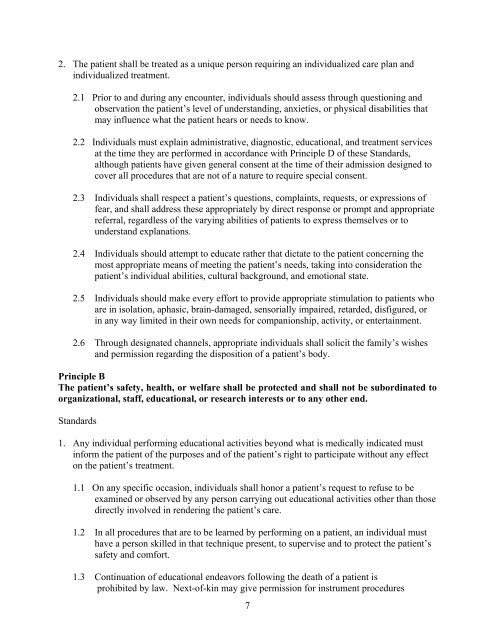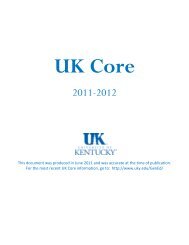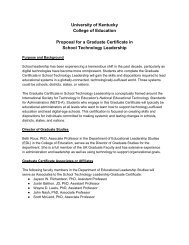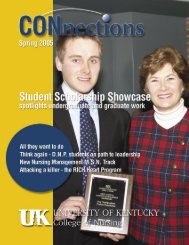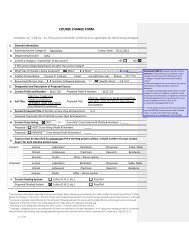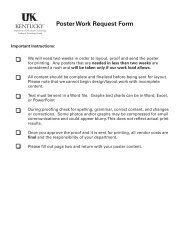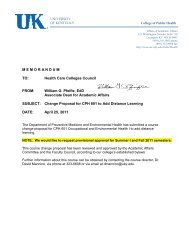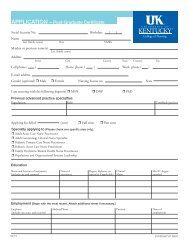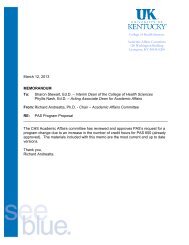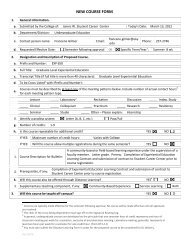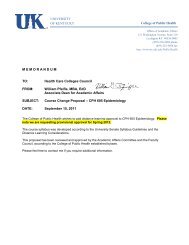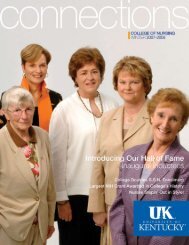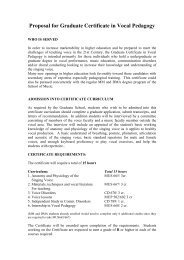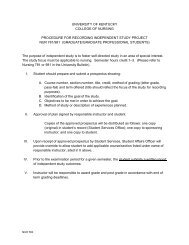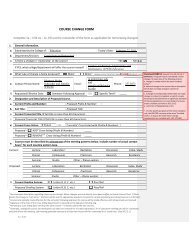05-06 Graduate Student Handbook.pdf - University of Kentucky
05-06 Graduate Student Handbook.pdf - University of Kentucky
05-06 Graduate Student Handbook.pdf - University of Kentucky
You also want an ePaper? Increase the reach of your titles
YUMPU automatically turns print PDFs into web optimized ePapers that Google loves.
2. The patient shall be treated as a unique person requiring an individualized care plan and<br />
individualized treatment.<br />
2.1 Prior to and during any encounter, individuals should assess through questioning and<br />
observation the patient’s level <strong>of</strong> understanding, anxieties, or physical disabilities that<br />
may influence what the patient hears or needs to know.<br />
2.2 Individuals must explain administrative, diagnostic, educational, and treatment services<br />
at the time they are performed in accordance with Principle D <strong>of</strong> these Standards,<br />
although patients have given general consent at the time <strong>of</strong> their admission designed to<br />
cover all procedures that are not <strong>of</strong> a nature to require special consent.<br />
2.3 Individuals shall respect a patient’s questions, complaints, requests, or expressions <strong>of</strong><br />
fear, and shall address these appropriately by direct response or prompt and appropriate<br />
referral, regardless <strong>of</strong> the varying abilities <strong>of</strong> patients to express themselves or to<br />
understand explanations.<br />
2.4 Individuals should attempt to educate rather that dictate to the patient concerning the<br />
most appropriate means <strong>of</strong> meeting the patient’s needs, taking into consideration the<br />
patient’s individual abilities, cultural background, and emotional state.<br />
2.5 Individuals should make every effort to provide appropriate stimulation to patients who<br />
are in isolation, aphasic, brain-damaged, sensorially impaired, retarded, disfigured, or<br />
in any way limited in their own needs for companionship, activity, or entertainment.<br />
2.6 Through designated channels, appropriate individuals shall solicit the family’s wishes<br />
and permission regarding the disposition <strong>of</strong> a patient’s body.<br />
Principle B<br />
The patient’s safety, health, or welfare shall be protected and shall not be subordinated to<br />
organizational, staff, educational, or research interests or to any other end.<br />
Standards<br />
1. Any individual performing educational activities beyond what is medically indicated must<br />
inform the patient <strong>of</strong> the purposes and <strong>of</strong> the patient’s right to participate without any effect<br />
on the patient’s treatment.<br />
1.1 On any specific occasion, individuals shall honor a patient’s request to refuse to be<br />
examined or observed by any person carrying out educational activities other than those<br />
directly involved in rendering the patient’s care.<br />
1.2 In all procedures that are to be learned by performing on a patient, an individual must<br />
have a person skilled in that technique present, to supervise and to protect the patient’s<br />
safety and comfort.<br />
1.3 Continuation <strong>of</strong> educational endeavors following the death <strong>of</strong> a patient is<br />
prohibited by law. Next-<strong>of</strong>-kin may give permission for instrument procedures<br />
7


